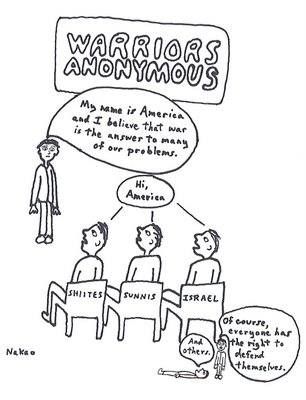Al-Hakim supports decentralization
"On Friday (July 28), one of the country’s top Shiite leaders, Abdul Aziz al-Hakim, called for Iraqis to wrest control of security from the hands of the Americans. Mr. Hakim presides over the main Shiite political bloc and oversees the Badr Organizaton, an Iranian-trained militia. He has been pushing to carve the country into three large autonomous regions.
Ripples of violence could be felt across Iraq on Saturday. The coach of the national soccer team resigned on Friday because of threats, sports officials said. The coach, Akram Ahmed Salman, turned in his resignation in Erbil, the Kurdish city where the team is training, said Abdul Khalak Massoud, the financial secretary of the Iraqi Football Federation.
Mr. Massoud said Mr. Salman had received two phone calls within two days warning him that his family would be killed unless he quit. “It’s so weird,” Mr. Massoud said.
Violence against athletes and sports directors has been on the rise in recent weeks. Earlier this month, gunmen abducted the chairman of the Iraqi National Olympic Committee and at least 30 other officials and bodyguards in a brazen daylight raid. Before that, Iraq’s national wrestling coach and several top tennis players were killed in separate attacks." [2]
"Political commentators seem to have mixed feelings about al-Hakim and occasionally treat him with unjustified harshness. In its editorial (January 12, 2006), the New York Times called him a political incendiary and a threat to Iraq. Whether or not this accurately characterizes al-Hakim’s true nature is an open question. His defenders view him as a shrewd politician who advocates their cause tirelessly. His adversaries regard him as a divisive wheeler and dealer who, more often than not, creates rather than solves problems.
Those who are intimately familiar with Iraqi politics and history argue that al-Hakim is a political actor shaped by events beyond his control. These events have catapulted him onto the center of the political stage. The traumatic years of 1958-1963, the rise and tragic death of his older brothers, and his troubled exile in Iran have all had an impact on al-Hakim‘s personality.
. . . In recent months, al-Hakim more than ever has strengthened his relationships with the representatives of the occupation powers. Furthermore, he visited Irabil in Northern Iraq and promised Kurdish separatists to transfer Iraq into semi-independent three regions. This has angered the majority of Iraqis who regards the proposed division as a threat to the democratic order and peace and security in Iraq. Since then, al-Hakim has faced mounting pressures, to espouse patriotic agenda, from two credible rivals: Al-Dawa Party and Sadrist movement.
In fact, al-Hakim's efforts since the assassination of his brother in 2003 have primarily aimed at creating an environment conducive to positioning himself politically. He understands that he has neither the clear vision nor the capability of his late brother to lead Iraq. This may explain his inclination to stress a sectarian message and his insistence on a form of a weak central government and a form of federalism along the sectarian and ethnic lines." [3] *
Al-Hakim "voiced strong support for the prime minister's program to bring Iraq's various factions together to reconcile their differences through dialogue and said it was the first of the four steps essential to restoring security. Iraqis, Hakim said, 'have to understand each other. 'Second, he said, was to 'strengthen the government and its agenda for fighting terrorism.' Hakim said the third key was to the rebuild the shrine in the northern city of Samarra, which was destroyed Feb. 22 by a bombing that the government has since blamed on the insurgent group al-Qaeda in Iraq. Almost immediately after the attack, much of Iraq was engulfed in sectarian violence . . . Hakim's contention that neighborhoods should form their own defense committees -- his fourth step -- is shared by many Iraqis who feel they cannot rely on their country's security forces or foreign troops to protect them. Others, however, have expressed fears that the people's committees would amount to nothing more than de facto militias in a country where militia attacks have caused much of the bloodshed. Militias associated with Shiite parties -- including the armed wing of Hakim's Supreme Council, known as the Badr Organization -- have been widely accused of mass killings and kidnappings of Sunni Arabs." [4]
"Abdul Aziz al-Hakim is . . . the leader of the Supreme Council for Islamic Revolution in Iraq (SCIRI), a large, influential, and moderate Iraqi Shiite political organization formerly based in Iran. Having long opposed Saddam and operated clandestinely against his regime, SCIRI did not interfere with the U.S.-led invasion, and it has since formed a tactical alliance with the Coalition Provisional Authority. Al-Hakim is also believed to be the commander of SCIRI's militia group, the Badr Brigade." [5]
footnote
* This February 23, 2006 Al Jazeera article appeared one day after the bombing of the Shiite's al-Askari shrine in Samarra. [6]
sources
[1] The Washington Post. Iraqi Official Warns Against Coup Attempt. July 29, 2006.
[2] The New York Times. Pentagon Extends Tour for 4,000 Troops, Increasing Number in Iraq. July 30, 2006.
[3] Al Jazeerah. The Making of Abdul Aziz al-Hakim. February 23, 2006
[4] The Washington Post. Shiite Party Leader Outlines 4 Steps for Iraq to Curb Violence. July 25, 2006.
[5] Frontline. Beyond Baghdad. Interviews. Abdul Aziz al-Hakim. February 12, 2004.
[6] BBC News. Iraqi blast damages Shia shrine. February 22, 2006.
posted: july 31, 2006, 10:01 AM ET
update: august 2, 2006, 5:25 AM ET



